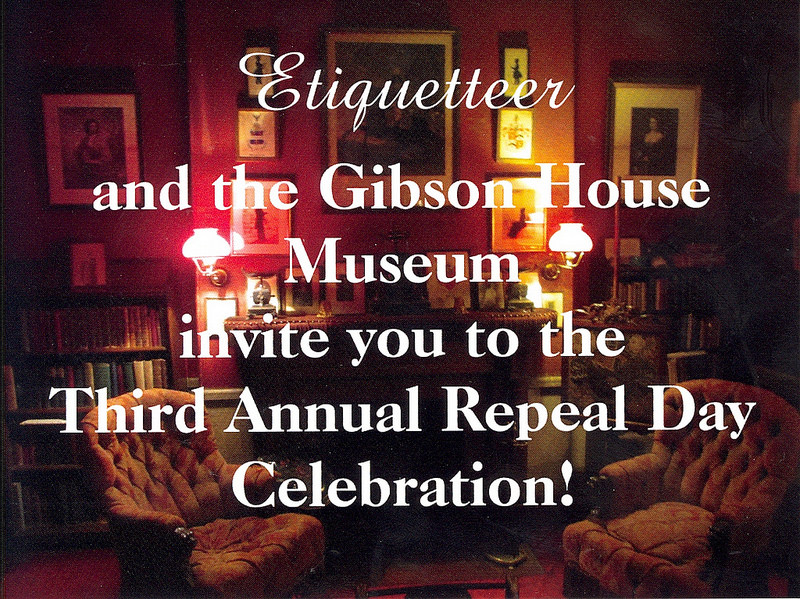This was originally published on November 23, 2002.
Dear Etiquetteer:
My older brother is deeply in debt. I don't see him very often because he lives in another state and we've never been very close. Is there any polite way I can let him know that in lieu of buying and mailing me a gift and getting more into debt, I'd prefer that he redirect that money toward paying off his debts? Personally, I'm not into gift giving and would prefer to make a donation to a charity in his honor or do community service.
This ties in with another gift-related question. My parents have retired and I know that their retirement income took a hit due to the stock market. In the past we'd talked about reducing the amount of family gift giving, and I'd like to broach the subject again. Any suggestions?
Dear Gifted and Astute:
Etiquetteer thanks you for raising this sensitive issue, with which so many well-meaning people wrestle in their attempts to alleviate the spending of others. Christmas has become so heavily identified with the exchange of gifts that many remain blind to the True Spirit of Christmas, the expression of Love.
It is never good manners to tell people how to spend money on you, so you’re skating on thin ice to tell your brother how to spend money on himself. Has he made it a practice to send you a gift each year? While you may not consider yourselves close, he could feel stung were you to announce that you’d prefer not to continue the one annual ritual that reinforces your connection.
Etiquetteer rarely recommends candor but believes you must be completely honest with your brother. Not about his debts, but about your aversion to holiday giving. This is more than Lovely Note material; a Lovely Letter is in order. Write and say as beautifully as you can that you’ve reached a stage in life where tangible things mean far less to you than people, including him. Recall for him in your letter particular memories of childhood (good ones, please), and express the wish that he do the same for you this Christmas. If he is as in debt as you suggest, Etiquetteer thinks he will leap at the chance to avoid getting you another gift certificate.
The formula changes only slightly with your parents, since you’ve discussed it before. Write or telephone “Mamma dear, remember once we talked about not putting so many things under the Christmas tree? Let’s do that this year and just give each other one little present apiece instead of a galaxy of gifts.” Don’t allude to their reduced income; fixing on your own disinclination to exchange presents will spare them embarrassment.
Etiquetteer is delighted to see your interest in charity and volunteer service, but urges you not to fall into the self-satisfying delusion that these activities will be considered gifts by the persons to whom you designate them.

Dear Etiquetteer:
I have problems about money gifts. First, the gift of money to friends and family. Unless one is in dire straits or the group is combining resources for an expensive item not suitable for shipping, sending money is like paying a bill: One writes a check to the credit card company, a check to the electric company, and a check to Georgie. And Happy Holiday.
Worse are the parents who say their teenager wants nothing less than a car so please send him/her money. These are also the parents to teach them that an endorsement on a check is a thank-you note.
Next, the custom of the Christmas List. First, it's tots who write to Santa. Sweet, cute, adorable, okay. Secondly, adults who make lists of stuff they want people to give them. I consider this the ultimate of tacky but to give that person something you know in advance they don't want . . . ugh!
Dear Exasperated:
Etiquetteer shares your preference for not giving gifts of money, your aversion to parents blind to all but the knowledge that they can’t afford a car for Junior, and your observation that adults have no business circulating their own gift lists unbidden. What if someone sent around a list of things one wanted and nobody was planning to get one a gift anyway?! One then looks like a greedy fool -- or a rapacious bride. To maintain a wish list at, say, amazon.com for one’s own reference is Perfectly Proper. It’s quite another thing to send everyone one knows a link to it.
That said, intentionally giving someone something one already knows is unwelcome -- the classic example is the fur coat to the vegetarian -- would certainly affront them. If you are approaching the holiday season with that sort of fierce-hot malice, Etiquetteer invites you to look deep into your heart (are you looking?) and to remember that Christmas is a time for healing, not hurting. If you cannot plan a present for someone in a spirit of Love, then perhaps you had better not give any presents at all. Use your shopping time to sit quietly and reflect on What and Who is Important to You, and Why. When you’ve figured it out, then you will be ready to give in a Perfectly Proper Spirit.

All this talk about the True Spirit of Giving forces Etiquetteer to recall that Christmas Custom to Create Camaraderie, the Secret Santa. For those not initiated in this Joyous Holiday Ritual, it involves everyone in an office or dormitory drawing names from a hat. (Does anyone really still wear a hat?) One then goes about preparing secret gifts and surprises on a periodic basis for the person whose name one drew to generate holiday excitement. Everyone’s Secret Santa is revealed at a holiday party just before Christmas or after Finals.
It has been Etiquetteer’s misfortune in these Exercises in Enforced Gaiety to draw either a complete stranger or sworn enemy. After a giftless two weeks, Etiquetteer always receives the apologies of the one person in the group who was too busy, lazy, or forgetful to bother to do a *@#! thing. Merry Christmas!
But Etiquetteer will never forget the exquisitely wrapped box left on his office chair by his last Secret Santa. Opening it with excitement in the presence of colleagues who “just happened” to be there, Etiquetteer burrowed through layers and layers of red and green tissue to find a carefully chosen lump of coal.
Since then, the Scrooge & Marley sign has remained firmly on Etiquetteer’s office door, but Etiquetteer is always more than ready to quaff a Beverage of Festivity at the Office Party.











